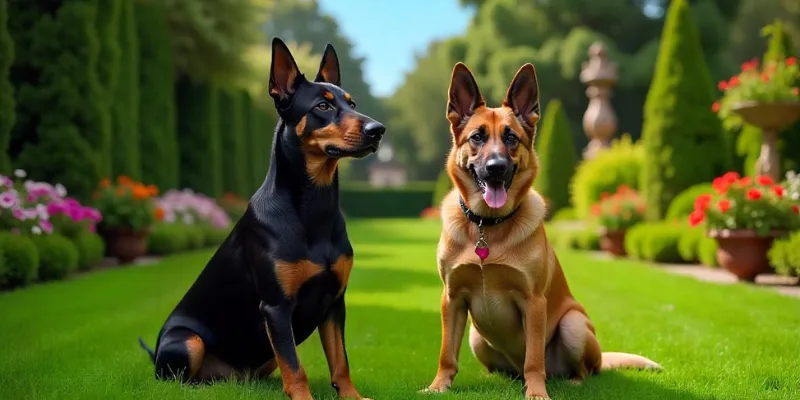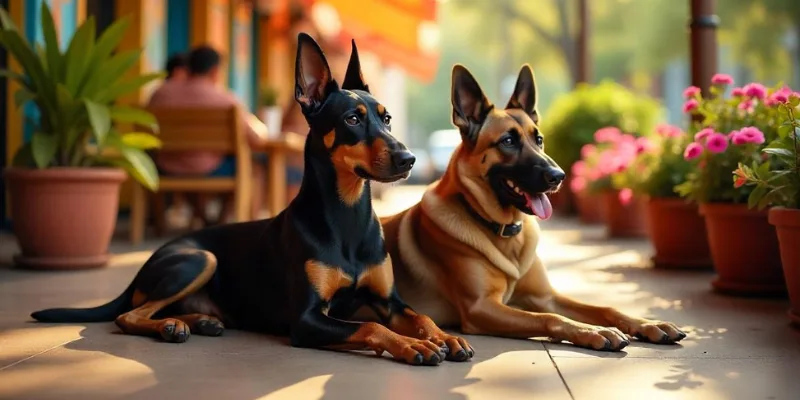The Perfect Cross Breed Doberman and German Shepherd
Updated: October 12, 2024
22
The Cross Breed Doberman and German Shepherd, often referred to as a Dober Shepherd, is a remarkable hybrid that combines the intelligence, loyalty, and nurturing instincts of two of the world’s most renowned breeds. Owners can expect a loyal companion who excels in obedience, agility, and guarding by crossing the sleek and agile Doberman Pinscher with the courageous and confident German Shepherd. With their striking appearance, athletic build, and unwavering devotion, the Cross Breed Doberman and German Shepherd have become popular for active families, law enforcement, and security professionals seeking a reliable and intelligent canine partner.
Characteristics of the Cross Breed Doberman and German Shepherd
Physical Appearance
The Doberman and German Shepherd cross-breed is known for its striking, athletic appearance. These dogs are generally medium to large-sized, standing anywhere from 22 to 26 inches tall and weighing between 75 and 100 pounds, depending on the biological traits they inherit from their parent breeds. Their coat is usually short to medium in length, often sleek like a Doberman’s, but may have the dense double coat of the German Shepherd.

Doberman Shepherd Physical Characteristics
| Category | Description | Variations |
|---|---|---|
| Coat Color | A mix of black, tan, brown, or blue | Various combinations |
| Ear Type | Upright (German Shepherd) or Cropped (Doberman) | Both styles possible |
| Body Type | Muscular build, athletic | Elegant and powerful appearance |
| Stance | Alert, confident | Reflects intelligence and loyalty |
| Overall Appearance | Elegant, powerful, intelligent | Unique blend of Doberman and German Shepherd traits |
Temperament and Behavior Traits
The Doberman Shepherd is a loyal, protective, and intelligent dog. It inherits the Doberman’s natural guarding instincts and the German Shepherd’s versatility and trainability. These dogs are typically confident and fearless, making them excellent watchdogs. However, with proper training and socialization, they can also be gentle, loving companions, especially with children.
Doberman Shepherd Characteristics
| Category | Description |
|---|---|
| Intelligence | High, quick learners |
| Stimulation Needs | Requires mental and physical stimulation |
| Consequences of Lack of Stimulation | Boredom, destructive behavior |
| Loyalty | Strongly bonds with family |
| Separation Anxiety | Prone to anxiety if left alone for long periods |
Exercise and Training Needs
Dobermans and German Shepherds are active breeds; their crossbreed is no different. A Doberman Shepherd requires regular, vigorous exercise to stay happy and healthy. Daily walks, playtime, and activities like running, hiking, or agility training are great ways to meet their physical needs.
Benefits of Training a Doberman Shepherd
- Training is essential to help manage their energy and ensure they grow into well-mannered adults. Early discipline training and socialization are crucial for curbing potential behavioral issues. Their intelligence and eagerness to please make them highly trainable, but continuity and positive reinforcement are key to success.
Health Considerations
Common Health Issues in Both Dobermans and German Shepherds
Dobermans and German Shepherds have a few health concerns that may affect their crossbreed offspring. Dobermans are known to be prone to heart problems like dilated cardiomyopathy, hip dysplasia, and thyroid issues. German Shepherds, on the other hand, are prone to hip and elbow dysplasia, degenerative myelopathy, and swell (gastric torsion).
Potential Health Concerns in the Cross-Breed
The Doberman Shepherd may inherit some of these health issues, though the genetic diversity in crossbreeds can sometimes reduce the risk of certain conditions. Nevertheless, monitoring for signs of joint issues, heart problems, and bloat in this breed is essential. Regular vet check-ups, a healthy diet, and proper exercise can help mitigate some of these risks. Potential owners should also consider getting health screenings for conditions like hip dysplasia if they adopt from a breeder.

Care and Maintenance
Grooming Requirements
The Doberman Shepherd requires relatively low grooming maintenance, but this can depend on the coat it inherits. If it has a sleek coat, weekly brushing should suffice to keep it healthy and remove loose hair. If it has a German Shepherd’s double coat, it may require more frequent brushing, particularly during shedding seasons.
- Bathing should only be done as needed, as over-bathing can strip the natural oils from their coat. Regular ear checks, nail trims, and dental care are also important to keep your dog in good condition.
Nutritional Needs
As a large, active breed, the Doberman Shepherd requires a high-quality diet that meets its energy needs. Its diet should be rich in protein to support muscle growth and maintenance, and it will benefit from foods that contain omega-3 fatty acids for healthy skin and coat. It’s also essential to monitor calorie intake, as obesity can exacerbate health issues like joint problems.
- Portion control and feeding them in multiple small meals can help reduce the risk of swell, a common issue in both parent breeds.
Exercise Regimen
Exercise is critical for the Doberman Shepherd’s physical and mental well-being. Aim for at least 60-90 minutes of daily endeavor, including walks, playtime, and mental stimulation like puzzle toys or obedience training. These dogs thrive on having a job, so activities like agility courses, fetch, or even advanced obedience work can keep them engaged and happy.
Training Tips
Training Methods That Work Well for Both Breeds
| Category | Recommendations | Benefits |
|---|---|---|
| Training Method | Positive Reinforcement | Encourages learning, motivation |
| Rewards | Treats, Praise, Playtime | Boosts confidence, obedience |
| Consistency | Vital for effective training | Prevents confusion, ensures progress |
| Socialization | Early, consistent exposure | Reduces fear-based behaviors, promotes calm interactions |
| Socialization Targets | Other pets, children, strangers | Enhances social skills, confidence |
| Environmental Exposure | New environments, sounds | Builds resilience, adaptability |
| Age for Socialization | Juvenile (8-16 weeks) | Critical period for development |
Challenges and How to Overcome Them
One of the primary challenges with a Doberman Shepherd is managing their high energy levels and need for mental stimulation. Without enough exercise, they can become destructive or anxious. Make sure they have plenty of outlets for their energy and challenge their minds with puzzle toys or training exercises.
- Separation anxiety can also challenge this breed, as they bond closely with their families. Gradually teaching your dog to be alone and providing interactive toys or calming aids can help reduce anxiety when left alone.
Lifestyle and Environment
Ideal Living Situations for the Cross-Breed
| Category | Requirements | Recommendations |
|---|---|---|
| Household Type | Active household | Families with multiple members, busy schedules |
| Space | Plenty of space to run | Homes with yards, access to parks or outdoor areas |
| Exercise | Daily exercise, stimulation | Regular walks, runs, playtime, training sessions |
| Living Situation | Best: homes with yards | Apartment living possible with significant exercise commitment |
| Energy Release | Regular outdoor time | Daily opportunities for physical activity |
Compatibility with Other Pets and Children
When properly socialized, the Doberman Shepherd can be an excellent companion for children. They tend to be protective but gentle with young family members. However, due to the dog’s size and strength, supervision is always recommended, especially with younger children.
- As for other pets, early socialization is key to ensuring your Doberman Shepherd can live peacefully with other animals. Their protective instincts may cause issues with smaller pets, so it’s important to introduce them to other animals in a controlled and constructive environment.
Conclusion
Recap of Key Points About the Cross Breed Doberman and German Shepherd
The Doberman Shepherd is a powerful, intelligent, and loyal hybrid that combines the best qualities of the Doberman Pinscher and the German Shepherd. Its striking appearance, high energy, and protective nature make it ideal for active families or individuals. However, proper training, socialization, and a commitment to regular exercise are required to ensure it thrives.
Final Thoughts on the Benefits and Responsibilities of Owning a Cross-Breed
Owning a Doberman Shepherd comes with both rewards and responsibilities. Their loyalty, protectiveness, and intelligence make them exceptional companions, but potential owners must be prepared to meet their high energy levels and training needs. With the right care and environment, the Doberman Shepherd can be a loving and devoted member of any family.
Faqs
What is a crossbreed of Doberman and German Shepherd?
A crossbreed of Doberman and German Shepherd is a mix of popular dog breeds that results in a unique and intelligent canine companion.
What are the characteristics of a German Shepherd and a Doberman crossbreed?
Cross-breed German Shepherd and Doberman dogs often inherit traits from both parent breeds, including loyalty, intelligence, and agility. They are known for their protective nature and make excellent guard dogs.
Are German Shepherd and Doberman cross-breeds good family pets?
Yes, cross-breed Doberman and German Shepherd dogs can make great family pets with proper training and socialization. They are steadfast, loving, and protective of their families.
What is the temperament of a crossbreed German Shepherd and Doberman?
These dogs are typically intelligent, loyal, and energetic. They require plenty of exercise and cognitive stimulation to stay happy and healthy.
How big do cross-breed German Shepherd and Doberman dogs get?
A crossbreed of Doberman and German Shepherd can vary in size, depending on the characteristics it inherits from each parent breed. However, they are usually medium—to large-sized dogs.
Do German Shepherd and Doberman crossbreeds have any health issues?
As with any mixed-breed dog, cross-breed Doberman and German Shepherd dogs may inherit health issues from their parent breeds. Working with a reputable breeder and arranging regular vet check-ups is important.
Please Write Your Comments